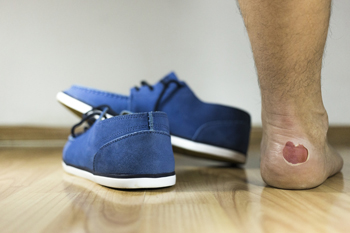 If you’ve ever had a blister on your foot, you most likely may be aware of the discomfort that is often associated with it. It is known to occupy a small area on your foot, and is filled with a liquid that acts as a protective covering for the skin. The most common cause of foot blisters is friction, and this may be a result of wearing shoes and socks that are too tight. If the shoes that are worn, pinch the toes or heels, blisters may often form to protect the feet. There are additional ways for blisters to develop, and these may include having an allergic reaction, enduring frostbite or burns, or excessive moisture. If you have noticed blisters on your feet, it is advised to protect it by covering the blister with a bandage so the healing process can begin. If the blister should become infected, it’s suggested to speak with a podiatrist as quickly as possible to discuss the best treatments for you.
If you’ve ever had a blister on your foot, you most likely may be aware of the discomfort that is often associated with it. It is known to occupy a small area on your foot, and is filled with a liquid that acts as a protective covering for the skin. The most common cause of foot blisters is friction, and this may be a result of wearing shoes and socks that are too tight. If the shoes that are worn, pinch the toes or heels, blisters may often form to protect the feet. There are additional ways for blisters to develop, and these may include having an allergic reaction, enduring frostbite or burns, or excessive moisture. If you have noticed blisters on your feet, it is advised to protect it by covering the blister with a bandage so the healing process can begin. If the blister should become infected, it’s suggested to speak with a podiatrist as quickly as possible to discuss the best treatments for you.
Blisters are prone to making everyday activities extremely uncomfortable. If your feet are hurting, contact Dr. Howard Horowitz of Bowie Foot & Ankle . Our doctor can provide the care you need to keep you pain-free and on your feet.
Foot Blisters
Foot blisters develop as a result of constantly wearing tight or ill-fitting footwear. This happens due to the constant rubbing from the shoe, which can often lead to pain.
What Are Foot Blisters?
A foot blister is a small fluid-filled pocket that forms on the upper-most layer of the skin. Blisters are filled with clear fluid and can lead to blood drainage or pus if the area becomes infected.
How Do Blisters Form?
Blisters on the feet are often the result of constant friction of skin and material, usually by shoe rubbing. Walking in sandals, boots, or shoes that don’t fit properly for long periods of time can result in a blister. Having consistent foot moisture and humidity can easily lead to blister formation.
Prevention & Treatment
It is important to properly care for the affected area in order to prevent infection and ease the pain. Do not lance the blister and use a Band-Aid to provide pain relief. Also, be sure to keep your feet dry and wear proper fitting shoes. If you see blood or pus in a blister, seek assistance from a podiatrist.
If you have any questions, please feel free to contact our office located in Bowie, MD. We offer the newest diagnostic and treatment technologies for all your foot care needs.
Read more about Blisters on the Feet